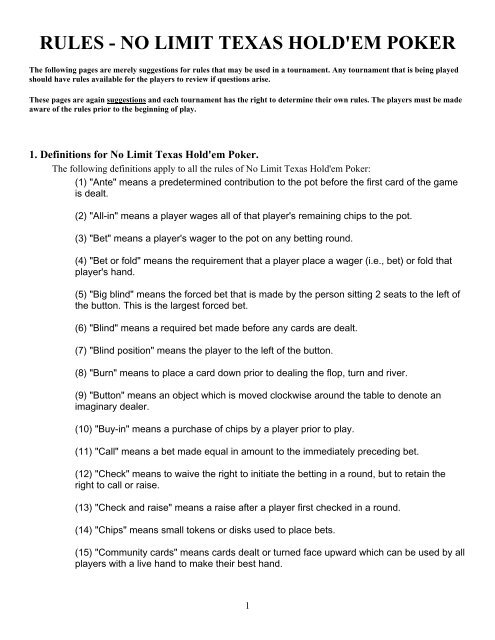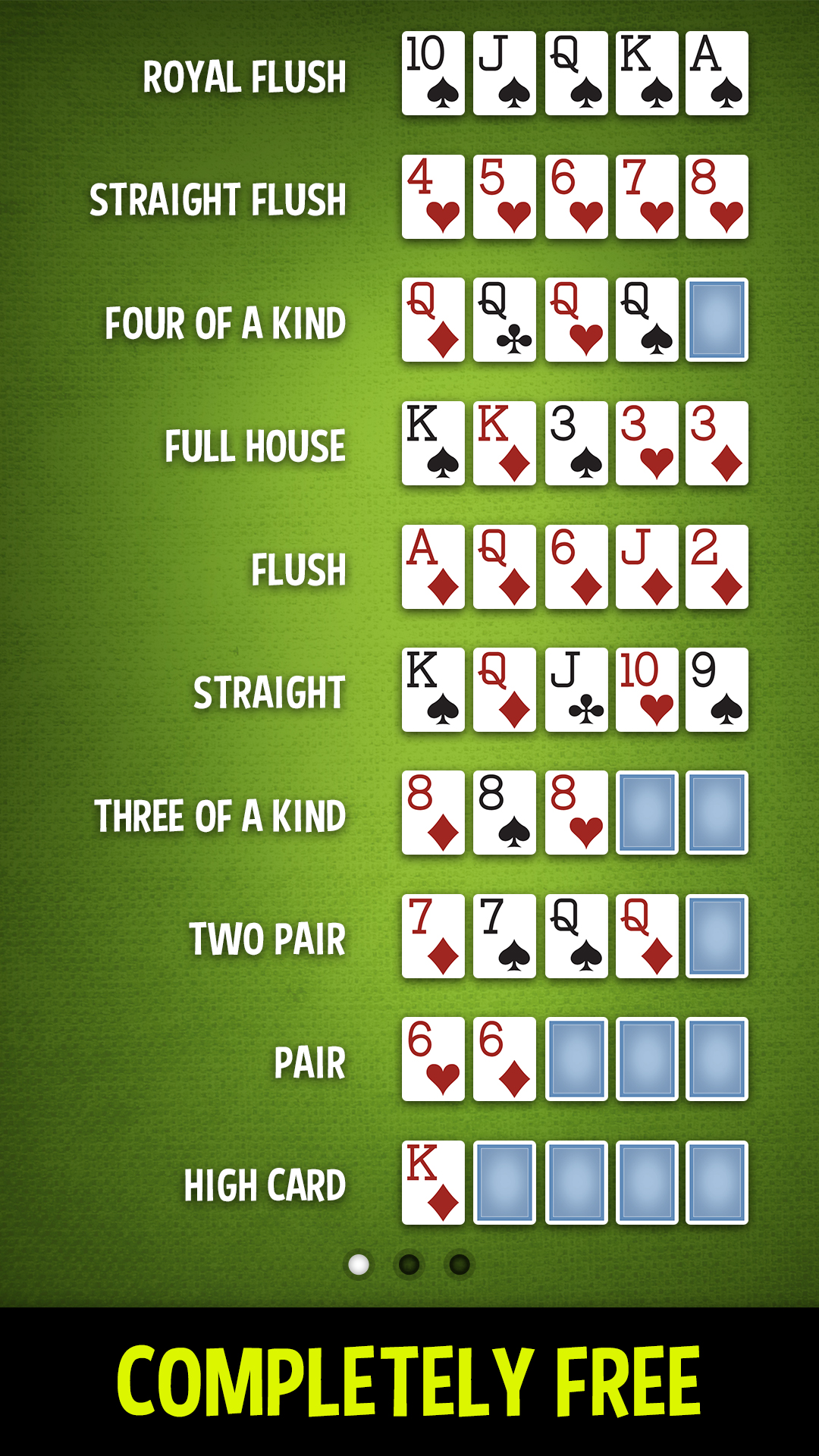Texas Holdem All In Rules
Texas Holdem poker does have something called blinds though. They are another type of forced bet, but this time before you have been dealt your cards. Like antes, they exist so that there is a cost to playing, so the poker games don’t go on and on with players just waiting to be dealt a great hand. Paul Phua thinks that the blind keeps the. All the rules of Texas Hold’em you need to start playing the game today. Texas Hold’em and especially no-limit Hold’em (NLHE) is the most commonly played poker game in live card rooms and casinos around the world. In this article, I’d like to teach you how to play Hold’em poker as well as discuss some beginner strategies for playing solid poker. A standard Texas hold 'em game with blinds. A blind bet or just blind is a forced bet placed into the pot by one or more players before the deal begins, in a way that simulates bets made during play. The most common use of blinds as a betting structure calls for two blinds: the player after the dealer blinds about half of what would be a normal. Texas Holdem All-In Question. This is regarding a texas holdem no limit home game. After the flop, player 1 and player 2 are the only remaining who bet. After the turn of the river card, player 1 goes all in. Player 2 decides to call but does not use the word 'call' but says 'full house' and flips his cards over. Player 2 has the highest hand.
Texas hold 'em (also known as hold'em or holdem) is another version of the standard card game of poker. A dealer shuffles the cards then deals 2 cards to each player and then five community cards are placed by the dealer—a series of three ('the flop') then two additional single cards ('the turn' and 'the river'). Players have the option to check, bet or fold after each deal, i.e. betting may occur prior to the flop, 'on the flop,' 'on the turn,' and 'on the river.'
Texas hold 'em players compete either for an amount of money or chips contributed by the players themselves (this is called the pot). Because the cards are dealt randomly and outside the control of the players, each player attempts to control the amount of money in the pot based on the hand he or she is holding.
The game is made up of a series of hands or deals. At the conclusion of each hand, the pot is usually awarded to one player (although it can on occasions be split). A hand may end at the showdown, in which case the players that are still in play, compare their hands and the highest hand is naturally awarded the pot. Another possible outcome of a hand is when all but one player have folded and given up any claim to the pot, in which case the pot is awarded to the player who has not folded and is therefore still in play
When a Texas Hold'em Poker player wants to play poker, the general objective is not to win every individual hand, but rather to make mathematically and psychologically correct decisions regarding at what point and how much to bet, raise, call or fold. By skilfully making such decisions, successful Texas Hold'em Poker players maximize winnings in the long term.
Texas Holdem Rules Printable
In hold'em, players receive two down cards as their personal hand (holecards), after which there is a round of betting. Three board cards are turned simultaneously (called the flop) and another round of betting occurs. The next two board cards are turned one at a time, with a round of betting after each card. The board cards are community cards, and a player can use any five-card combination from among the board and personal cards. A player can even use all of the board cards and no personal cards to form a hand ('play the board'). A dealer button is used. The usual structure is to use two blinds, but it is possible to play the game with one blind, multiple blinds, an ante, or combination of blinds plus an ante.
Rounds of Betting

Basic Rules Of Texas Holdem
- Opening deal- Each player is dealt two cards face down, which are known as hole cards or pocket cards.
- First round of betting- Starting with the player to the left of the big blind, each player can call the big blind, raise, or fold. The big blind has the option to raise an otherwise unraised pot.
- The flop- The dealer burns a card, and then deals three community cards face up. The first three cards are referred to as the flop, while all of the community cards are collectively called the board.
- Second round of betting- Starting with the player to the left of the dealer button, each player can check or bet. Once a bet has been made, each player can raise, call, or fold.
- The turn- The dealer burns another card, and then adds a fourth card face-up to the community cards. This fourth card is known as the turn card, or fourth street.
- Third round of betting- It follows the same format as the second round, but the size of the bets have usually doubled in limit games.
- The river- The dealer burns another card, and then adds a fifth and final card to the community cards. This fifth card is known as the river card, or fifth street.
- Final round of betting- It follows the same format as the second and third rounds.
- The showdown- Using the best five-card combination of their hole cards and the community cards, the remaining players show their hands, with the bettor or last raiser showing first. The highest five-card hand wins the pot. (In case of a tie, the pot is evenly split among the winning hands.)
Texas Hold'em Poker All In Rules
Other Texas Hold'em Poker Rules- These rules deal only with irregularities. SeeButton and Blinduse for rules on that subject.
- If the first or second hole card dealt is exposed, a misdeal results. The dealer retrieves the card, reshuffles, and recuts the cards. If any other holecard is exposed due to a dealer error, the deal continues. The exposed card can not be kept. After completing the hand, the dealer replaces the card with the top card on the deck, and the exposed card is then used for the burncard. If more than one hole card is exposed, this is a misdeal and there must be a redeal.
- If the flop contains too many cards, it must be redealt. (This applies even if it is possible to know which card is the extra one.)
- If the flop needs to be redealt because the cards were prematurely flopped before the betting was complete, or the flop contained too many cards, the board cards are mixed with the remainder of the deck. The burn card remains on the table. After shuffling, the dealer cuts the deck and deals a new flop without burning a card.
See Explanations,discussion #2, for more information on this rule. - If the dealer turns the fourth card on the board before the betting round is complete, the card is taken out of play for that round, even if subsequent players elect to fold. The betting is then completed. The dealer burns and turns what would have been the fifth card in the fourth card's place. After this round of betting, the dealer reshuffles the deck, including the card that was taken out of play, but not including the burn cards or discards. The dealer then cuts the deck and turns the final card without burning a card. If the fifth card is turned up prematurely, the deck is reshuffled and dealt in the same manner.
See Explanations,discussion #2, for more information on this rule. - If the dealer mistakenly deals the first player an extra card (after all players have received their starting hands), the card is returned to the deck and used for the burn card. If the dealer mistakenly deals more than one extra card, it is a misdeal.
- If you are playing the board, you must so declare before you throw your cards away; otherwise you relinquish all claim to the pot.